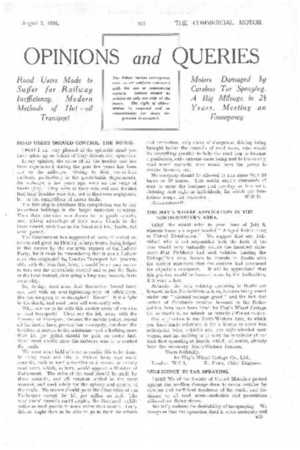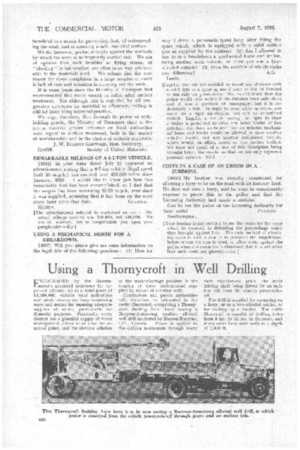OPINIONS and QUERIES
Page 29

Page 30

If you've noticed an error in this article please click here to report it so we can fix it.
ROAD USERS SHOULD CONTROL THE ROADS.
146011 I am very pleased at the splendid stand you have taken up on behalf of lorrydrivers and operators.
In my opinion, the cause of all the trouble that has been experienced during the past few years has been due to the railways. Owing to their , out-Of-date methods, particularly in the goods-traffic departments, the railways, a few years ago, were on the verge of bankruptcy." They were at their wits end and decided that their troubles were due, not to ;their own negligence, but to the competition of motor traffic.
The first step to eliminate this competition was to buy important holdings in the larger motorbus concerns. Then their attention was drawn to the goods. vehicle, and, taking advantage of their many friends in the Government, such laws as the Road and Rail Traffic Act were passed.
The Government has supported all sorts of vested interests and given its blessing to large trusts, being helped in this matter by the energetic support of the Labour Party, for it must be remembered that it was a Labour man who originated the London Transport Act, presumably with the idea that, later, it would be an easy matter to turn out the capitalistic control and to put the State at the head instead, thus going a long way towards State own ership So, to-day, road users find themselves bound hand and foot with an ever-tightening .rope of officialdom. But are we going to be strangled? Never ! It is a fight to the death, 'and road users will eventually win.
What are we to do with this motley array of enemies of road transport? Clear out the lot, away with the Ministry of Transport, disband the mobile police, repeal all the motor laws, prevent bus monopoly, cut down the taxation of motors to the .minimum—not a-farthing more than id. per gallon should be paid on motor fuel. Road users should show the railways who is to control the roads.
We want some bold scheme to enable this to be done. In every town and city in Britain form road users' councils, each to send' a member to a council of county road users, which, in turn, would appoint a Member of Parliament. The rules of the road should be made by " these councils, and all taxation settled in the same manner, and used solely for the upkeep and control of the roads. No money should go to the Chancellor of the Exchequer except the id, per gallon on fuel. The road users' councils could employ the dismissed mobile police as road guards to work under their control. Lorry drivers ought then to be able to go to them for advice and protection, only cases of dangerous driving being brought before the councils of road users, who would do everything possible to help the road hog to become a gentleman, only extreme cases being sent to the county road users' councils, who would have the power to revoke licences, etc.
No company should be allowed to run more than 50 buses or 50 lorries. This would enable thousands of men to enter the business and develop as free men, claiming their right as 'individuals, for which our fore fathers fought for centuries. W.M.B. Rickmansworth.'
THE HAY'S WHARF APPLICATION IN THE NORTH-WESTERN AREA.
140021 We would refer to your issue of July 9, wherein there is a report headed " Alleged Rate-cutting in Hot-oil Distribution." We suggest that any individual who is not acquainted with the facts of the case would very naturally couple the incorrect statement that Pickfords had sent .vehicles bearing the Metropolitan Area licence to operate in Bootle . with the further statement that the concern had canvassed the objector's customers. It will be appreciated that this practice would be frowned upon by the Authorities, if it were a fact.
Actually, the tank vehiclek operating in Bootle are licensed in the North-Western Area, licences being issued under our "claimed-tonnage grant," and the fact that certain of Pickford's vehicles licensed in the Metropolitan Area have been hired by Hay's Wharf Cartage Co. in Bootle is, we submit, an entirely different matter.
Our application to the North-Western Area, to which you have made reference, is for a licence to cover two articulated 6-ton vehicles and one eight-wheeled tank wagon, and has nothing to do with the remainder of our tank fleet operating at Bootle, which, of course, already bear the necessary North-Western licences.
Yours faithfully, for Hay's Wharf Cartage Co., Ltd., London, W.C.1. R. FARO, Chief Engineer.
NEGLIGENCE IN TAR SPRAYING.
F46031 We of the Society of United Motorists protest against the needless damage done to motor vehicles by careless and inefficient treatment of the roads, and the danger to all road users—motorists and pedestrians alike—from flying stones.
We fully endorse the desirability of tar-spraying. We recognize that the operation itself is often necessary and beneficial as a means for preventing dust, of waterproofing the rciad, and of ensuring a safe, non-skid surface.
We do, however, protest strongly against the methods by which the work is so frequently carried out. We are of opinion that such troubles as flying stones, or "bleeding" in hot weather, are often in no way attributable to the materials used. We submit that the true reason for these complaints in a large number of cases is lack of care and attention in carrying out the work.
It is some years since the Ministry of Transport first recommended that roads should be rolled after surface treatment. Yet although this is regarded by all progressive surveyors as essential to efficiency, rolling, is still far from being universal practice.
We urge, therefore, that through its power • of withholding grants, the Ministry of Transport shall in the future exercise greater influence on local authorities with regard to surface treatment, both in the matter of workmanship and in the choice of suitable materials: J. W. ELLIOTT-GARWOOD, Hon. Secretary, , Cardiff. Society of United Motorists.
REMARKABLE MILEAGE OF A 6-7-TON VEHICLE.
[4604] In your issue dated July 19 appeared an advertisement stating that a 6-7-ton vehicle (legal speed limit 20 m.p.h.) has covered over 450,000 miles since January, 1933. I would like to know just how this remarkable feat has been accomplished, as I find that the wagon has been averaging 22-23 m.p.h. ever since it was supplied, assuming that it has been on the road
every hour since that date. CURIOUS. Halifax.
[The advertisement referred to contained an error. The actual mileage covered was 250,000, not 450,000. We should, however, like to congratulate you upon your perspicacity.—ED.]
USING A MECHANICAL HORSE FOR A BREAKDOWN.
146051 Will you please give me some information on the legal side of the following questions !—(1) How far may I drive a pneumatic-tyred lorry after fitting the spare wheel, which is equipped with a solid rubber tyre as supplied by the makers? .(2) Am I allowed to tow in as a breakdown a mechanical horse and trailer, using another such vehicle," or must you use a fourwheeled vehicle? (3) Does the number of wheels make any difference? AG Leeds.
[Legally, you are not entitled to travel any distance with a solid tyre as a spare in use if your vehicle be licensed to run only on pneumatics.We do not think that the police would take action if the distance were only short and it was a question of emergency ; but it is undoubtedly a risk. In reply to your other question, you could use a rigid six-wheeler, but not an articulated vehicle. Legally, a vehicle " having the right to draw a trailer is permitted to draw one laden trailer or two unladen ; therefore, we believe that an unladen mechanical horse and trailer would be allowed to draw another unladen trailer, but not another articulated Vehicle, which would, in effect, count as two further trailers. We have not heard of a. case of this description being brought before the courts, so that we can only express a personal opinion.--En.]
COSTS IN A CASE OF AN ERROR IN A SUMMONS.
[4606) My brother was recently summoned for allowing a lorry to be on the road with an insecure load. He does not own a lorry, and he went to considerable expense to prove this to the police and that the Licensing Authority had made a mistake.
Can he sue the police or the Licensing Authority for these costs? PUZZLED. Southampton.
[Your brother iS not entitled to sue the police for the costs which he incurred in defending the proceedings which they brought against him. The only method of obtaining costs in such a case is to persuade the magistrates, before whom the case is tried, to allow costs against the police when .thesummons is dismissed, but it is not often that such costs are granted.—En.]












































































